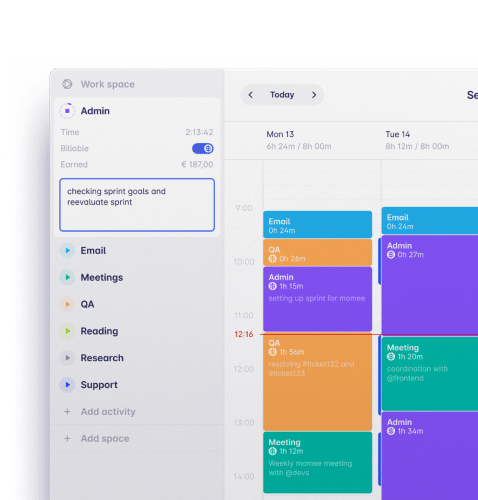How to Get Organized at Work When Overwhelmed
A rising feeling of anxiety is blooming in your chest, accompanied by cold sweats. This probably means you’re an overwhelmed employee.
This sense of dread and general anxiety can be avoided by implementing some organizational tips. And that’s what you’ll learn today: how to get organized at work when overwhelmed.

Take the first step towards organizing your work and start tracking time today
12 Ways to get organized at work when overwhelmed
- Don’t beat yourself up, and take a deep breath
- Do a “brain dump”
- Make use of time-tracking apps
- Organize the tasks by category or action
- Prioritize what you need to do
- Set realistic goals for the day
- Make sure your workspace is organized
- Leave some time for unexpected tasks
- Start easy and gradually increase in complexity of tasks
- Keep testing and choose the right productivity tools for you
- Delegate when needed
- Automate repeated processes
Getting organized at work isn’t quite as simple as just putting together a to-do list. It’s a soft skill worth learning. Even if you’re not organized at your core, you can still learn how to better prepare and manage your days at work.
The benefits are endless, the most important being a sense of happiness and tranquility at work.
Avoid stress and get organized when overwhelmed by using practical techniques and tools, both digital and analog.
1. Don’t beat yourself up, and take a deep breath
If you’re feeling overwhelmed, the worst thing you can do to yourself is beat yourself up or mistreat yourself for feeling stressed.
This is such a normal situation, that everyone faces. You just need an extra push to get back on track and focus on what you need to get done.
It’s important to redirect those feelings and channel them to find a solution to your problems.
If needed, take 10 minutes and do breathing exercises, meditate for a little bit, stare out a window or go outside and breathe fresh air.
Use these techniques to promote relaxation, lower your heart rate and regroup your thoughts.

Free eBook: How to work smart, not hard
Get your copy of the eBook to discover the best productivity tips for teams and their leaders
2. Do a “brain dump”
All the scattered ideas and messages in your brain need organization.
Get all those thoughts out and “dump” everything in a list, your planner, a productivity app, in a pack of sticky notes… Whatever works for you.
This kind of exercise is the first step toward staying on top of everything.
You’ll reorganize your overwhelmed brain and store every bit of information where it needs to be. Imagine your brain being like a set of drawers. Of labeled drawers, of course.
Your appointments, personal or professional appointments are in one drawer, meetings in another, urgent tasks in another… And so on.
Don’t censor yourself when “brain dumping”. Write everything you need and think of because if you’re not doing it as you write or type, you can organize it later.
You’ll feel your mind much lighter after this and ready to do the work.
3. Make use of time-tracking apps
When feeling overwhelmed at work, leveraging time-tracking apps can be a game-changer. These powerful tools help you gain valuable insights into how you spend your time and identify areas where improvements can be made.
Start by selecting a reliable time-tracking app that suits your needs and preferences. Set clear goals and allocate specific time blocks for different tasks or projects.
Use the app to track your time spent on each activity, allowing you to identify bottlenecks, prioritize effectively, and make necessary adjustments to your workflow. Regularly reviewing the data provided by the app will enable you to optimize your time management, regain control, and reduce overwhelm, ultimately leading to increased productivity and a greater sense of accomplishment.

Start tracking your time with zero effort
Track your time spent on each activity, allowing you to identify bottlenecks, prioritize effectively, and make necessary adjustments to your workflow
4. Organize the tasks by category or action
Your tasks and projects can be organized in several different ways, and you need to find the one that works best for you.
A good way of starting to get things done is to keep all your tasks and commitments in one place, be it digital or analogic, like a planner. Another good tip is to start every item with an actionable verb.
Don’t be vague when writing your to-do list. Use verbs such as “plan”, “solve, “create”, keeping them in imperative mode.
Then it’s time to organize the tasks in your list into categories. Something that maybe you already started doing while you “brain dumped”.
By categorizing tasks, you establish a reason for doing things, and by doing that, you turn your workload less overwhelming.
The kind of categories you choose to use can be helpful. Avoid grouping them by the project or by person, and instead, try organizing them by the due date, for example.
Separate those tasks that are time sensitive from those that just need to be set on a to-do list.
Do you want to know how to use a planner? Find how to increase your productivity with this tool in our article.

5. Prioritize what you need to do
Prioritizing tasks is also a form of organizing them into categories. Identifying the most urgent work that needs to be done is actually a strategic move.
You can prioritize things using different prioritization techniques. Once again, it’s all about finding a method that works for you.

Free eBook: How to work smart, not hard
Get your copy of the eBook to discover the best productivity tips for teams and their leaders
You can start working on smaller tasks that will lead to a bigger project.
You can organize your list by the due date, by what’s most important and not so much, or by attributing a code to your tasks. For example A-B-C. the A being the most urgent, or !, !!, !!!… You can do your own code.
6. Set realistic goals for the day
If you are fighting the anxiety that can be generated from that feeling of becoming overwhelmed, avoid any actions that can fuel that.
Know your limits, and don’t work yourself too much, too quickly. Make your list and timeline more realistic.
Set a goal for the day: “I’ll check off three items from my list today”. If the goal is accomplished and you’re left with extra time, that’s great. If not, you now are more aware of the limitations and obstacles of that task, meeting or commitment.
That’s why is important to set realistic goals. It’s all about motivation.
Do you want to learn how to set realistic goals? Then you need to read our blog!

7. Make sure your workspace is organized
A dirty workspace may explain why you’re feeling unproductive. So, a good way for keeping stress at bay is to keep your workspace clean.
Put everything away in its place and only leave what you need to do your work. Clean space, clean mind.
The same motto applies to your virtual workspace. Digital clutter can work wonders in reducing anxiety and improving your work life.
When you feel overwhelmed, try some of these things and do them regularly:
- Time block your calendar to reserve the time for each task;
- Keep your e-mail inbox at zero unread messages (or as close to this as possible);
- Read and clear all your notifications on different platforms and social media channels;
- Reassign and reorganize the overdue tasks and commitments.

Free eBook: How to work smart, not hard
Get your copy of the eBook to discover the best productivity tips for teams and their leaders
These simple actions are fundamental to avoid further stress. In the future, you will be thankful.
8. Leave some time for the extra or the unexpected
Estimate the time you’re going to spend on your tasks. Things happen when you least expect them, so it’s always best to be prepared for unexpected surprises.
You have no way of knowing when a crisis will hit, so all you can do is anticipate issues in case they happen.
Allow flexibility in your schedule for unexpected situations. If your calendar is packed with meetings, appointments, and commitments, something extra can mess up your day.
An excessive workload is one of the main causes of stress at work. So, leaving a few hours free for any of these situations is a good idea.
By doing this, you’ll feel less overwhelmed in case something happens.
Read also: Create a balance in your work by doing an effective workload analysis.
9. Start easy and gradually increase in complexity of tasks
Big goals and projects can feel very overwhelming and are hard to organize.
Breaking the big goals into smaller, more easily achievable ones is the way to go. Not only do things seem more doable, but achieving short-term goals is extremely motivating and will keep you going.
By breaking your goals down into actionable steps, you’re also avoiding stress and feeling overwhelmed at work.
Your daily efforts will have a big impact in the long run.
10. Keep testing and choose the right productivity tools for you
We reached the part of this list of suggestions that must be put into practice over time when you reach a strong pace in this path toward a state of being organized.
Once you find the best planner, the best marketing tool, the best note-taking app, and the best time tracker, keep them.
Use them well, and they will be your best friends. Enjoy the free trials and keep experimenting until you find them.
Additional tip: A workload management tool may be a great addition to help you organize.
11. Delegate when needed
Knowing how to delegate tasks, it’s a valuable skill for team leaders, project managers, and also team members. Make sure you and your colleagues are on the same wavelength and that you can easily distribute the tasks amongst yourselves.
Think about outsourcing if you work alone or your team is overworked.
Doing so allows you to focus on high-impact projects and symbolize an act of trust and validation.
Plan and align the important and urgent tasks for yourself to work on and those that, while not so important, still need to be done to delegate. Everything in between can be done in time.
TIP: Learn what are the 4 D’s of time management and why they’re important.

12. Automate repeated processes
Take advantage of the tech tools available and try to automate some processes. This will save you some valuable time and boost business efficiency and at the same time, your personal efficiency.
Organizations can only be boosted with automation technology by cutting down some manual labor and avoiding duplicate processes.
The best task automation tools can be used to assign tasks to people, send e-mails, set up digital campaigns, adjust deadlines, and provide people with the project’s status, among other possibilities.
Why is it important to be organized at work?
The major benefit of being an organized worker is that it reflects on the quality of the work you deliver.
You’re presented with opportunities to excel in your career when you’re organized and productive.
Your organization method is adaptable to your work style, aiding and benefiting your professional progress. A certainly positive and professional progress.
FAQ
How to get organized at work?
Getting work organized is not difficult. It’s all about establishing a routine for the most simple and essential tasks. You will create habits that, with time, will become innate. Keep everything in its right place, be it objects or virtual tools, and take notes. Write down everything: your lists, your due dates…
Learn how to time block or timebox with us, and focus on one task at a time. Carving out some time to organize the basics helps you create systems and boundaries that work for you.
How to get organized at work with ADHD?
First of all, if this is you, please talk to your doctor in case you need clinical help. Aside from that, we can give you some tips to get you started: set a goal and break it down into smaller pieces to get started and make sure you schedule the time you need to work on them. Start small to go big.
Read also
– What is ADHD procrastination and how to avoid it?
– ADHD planning: the ultimate guide you need
How to stay organized at work while working on multiple projects?
The keyword to this answer is prioritizing. After figuring out what is more urgent, divide your day or week into time blocks and use a time-tracking tool to help you.
Make sure you avoid the different time wasters and that your workspace is organized while working on your priorities list, and don’t be afraid of delegating if necessary. Be realistic about deadlines.
Conclusion
When feeling stressed and overwhelmed with work, asking for help is not a sign of weakness.
It’s taken as an actual method or organization. You’re aware of your needs and limitations and can use that information to develop your work and time management skills.
To avoid getting overwhelmed at work, establish the routine that works for you and make it happen.
You might be interested in: